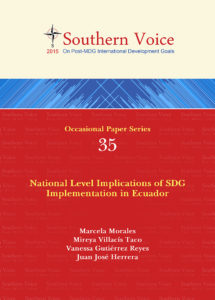 This study contributes to the understanding of the implications of Sustainable Development Goals (SDGs) implementation by presenting and analysing the case of Ecuador, based on lessons learned from implementing the Millennium Development Goals (MDGs). In general, the country will have to enhance its existing mechanisms to monitor the accomplishment of the SDGs in order to identify the areas where it will require further attention and more efforts, such as maternal and child mortality, gender equity and sustainability. It is also important and necessary to take full advantage of the existing institutional capacities and identify areas for improvement. In this sense, the monitoring process of the SDGs will have to include higher participation levels from institutions at the national level and stronger coordination with sub-national governments to observe the implementation and adaptation of goals and targets to the local realities. Among the main challenges for the country are the financial issues. A possible economic crisis might affect the country’s priorities in terms of funding and might have an impact on the adoption of the SDGs. This paper examines five key areas as a basis for further discussion and deeper analysis such as the integration of the SDGs in the national planning process; coordination, management and leadership; adequacy of financing and other means of implementation; partnership and stakeholder participation; and the capacity of national statistical agencies.
This study contributes to the understanding of the implications of Sustainable Development Goals (SDGs) implementation by presenting and analysing the case of Ecuador, based on lessons learned from implementing the Millennium Development Goals (MDGs). In general, the country will have to enhance its existing mechanisms to monitor the accomplishment of the SDGs in order to identify the areas where it will require further attention and more efforts, such as maternal and child mortality, gender equity and sustainability. It is also important and necessary to take full advantage of the existing institutional capacities and identify areas for improvement. In this sense, the monitoring process of the SDGs will have to include higher participation levels from institutions at the national level and stronger coordination with sub-national governments to observe the implementation and adaptation of goals and targets to the local realities. Among the main challenges for the country are the financial issues. A possible economic crisis might affect the country’s priorities in terms of funding and might have an impact on the adoption of the SDGs. This paper examines five key areas as a basis for further discussion and deeper analysis such as the integration of the SDGs in the national planning process; coordination, management and leadership; adequacy of financing and other means of implementation; partnership and stakeholder participation; and the capacity of national statistical agencies.
Authors: Marcela Morales, Mireya Villacís Taco, Vanessa Gutiérrez Reyes, Juan José Herrera

